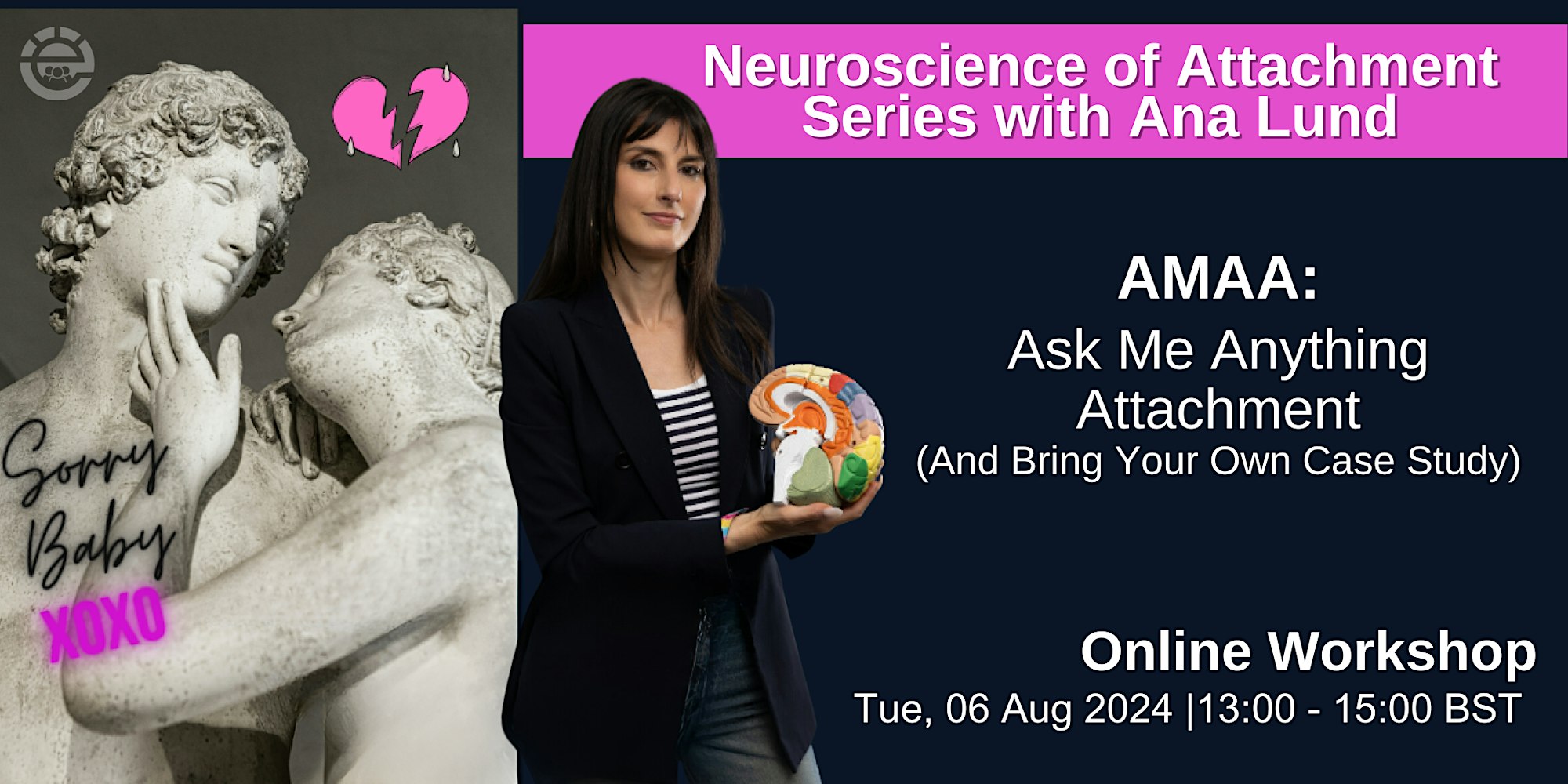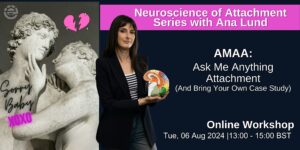About this event
This is the fourth and the last workshop from the series “The Social Neuroscience Of Adult Attachment: The How-To Guide For Therapy”. This series combines the modern neuroscience perspective on human attachment with practical strategies for working effectively with adult attachment styles in therapy.
By interweaving the concepts of neuroanatomy, brain chemistry, and the evolution of species, we will paint a picture of how human attachment came into being as a biological mechanism according to the view of contemporary social neuroscience.
We will explore the relationship between the modern neuroscience of attachment and classic attachment theory. We might even explore some tentative links between different attachment styles and the four personality brain-system-based types proposed by Dr Helen Fisher.
Despite the complex nature of the topic, the workshop will be hands-on and use a detailed case study to illustrate these complicated concepts, providing you with a set of neuroscience-informed tools to better facilitate work with clients who wish to understand or adjust their attachment style. Throughout, we will clarify and simplify some confusing and redundant vocabulary around attachment themes and indulge in some myth-busting.
You will have ample opportunity to reflect on your own experiences, including a dedicated session to bring questions or case studies and share them with the group.
Part I: Becoming a Unicorn: Neuroscience Guide to Avoidant Attachment Style (May 2024) BOOK HERE
Part II: Lovefool: Neuroscience Guide to Anxious Attachment Style (June 2024) BOOK HERE
Part III: Should I Stay Or Should I Go: A Guide To Working With The Fearful-Avoidant Attachment Style (July 2024) BOOK HERE
Part IV: AMAA: Ask Me Anything Attachment (And Bring Your Own Case Study) (August 2024)
In “AMAA: Ask Me Anything Attachment (And Bring Your Own Case Study)” we will consolidate the knowledge gained in the previous three sessions and you will have the opportunity to bring any question or reflection you might have regarding this fascinating topic as well as the opportunity to bring your own case study and discuss it with the group in the light of the neuroscience and social neuroscience of attachment. For confidentiality reasons, this session will not be recorded.
No previous knowledge of neuroscience or attachment theory is required in order to participate, curiosity about the topic is all you need. This workshop will provide you with tools and insights that you can immediately apply to your own practice.
Each workshop will be self-contained, so you can attend all the sessions or a single event as a stand-alone session.
Learning Objective Participants Can Expect From This Event
- Become familiar with the basic tenets of modern neuroscience model of human attachment
- Understand the evolutionary and adaptive value of different attachment styles
- Learn a set of effective neuroscience-informed interventions to work with a specific attachment style
Who is This Workshop Appropriate For?
- Any therapist interested in learning how to work with adult attachment styles in effective ways that are supported by modern neuroscience research on attachment.
How May This Workshop Impact Your Practice?
- Understanding of the roles that the attachment plays and its adaptive value for survival
- Communicating that understanding to the clients
- Use of effective neuroscience-informed strategies to work with attachment in the therapy room
Additional Resources:
*The summary of the modern neuroscience perspective on attachment
*The toolbox for effective work with avoidant attachment style
Main references:
White LO, Schulz CC, Schoett MJS, Kungl MT, Keil J, Borelli JL, Vrtička P. Conceptual Analysis: A Social Neuroscience Approach to Interpersonal Interaction in the Context of Disruption and Disorganization of Attachment (NAMDA). Front Psychiatry. 2020 Dec 23;11:517372. doi: 10.3389/fpsyt.2020.517372.
Long M, Verbeke W, Ein-Dor T, Vrtička P. A functional neuro-anatomical model of human attachment (NAMA): Insights from first- and second-person social neuroscience. Cortex. 2020 May;126:281-321. doi: 10.1016/j.cortex.2020.01.010.
ZOOM
This workshop will be hosted on the Zoom meeting platform where we will use our cameras and microphones to interact with each other as a group.
SELF-SELECT FEE
The self-select fee is a radical inclusion policy to open learning for all colleagues. The guide price for this event is £20.00, however, we appreciate that income varies greatly in different locations and circumstances. Please contribute what you can to help us maintain inclusive professional training.
___________________________
All the colleagues at ONLINEVENTS and the presenters we collaborate with are committed to working in a manner consistent with the BACP Ethical Framework, which can be accessed on the link below. When registering for this event you are agreeing to be present and interact in a manner that is consistent with this Framework.
Ana Lund

Ana is a psychotherapist working in private practice in the picturesque town of Ramsbottom, north of Manchester. Ana is passionate about combining neuroscience and psychotherapy. She spends much time pondering and discussing related topics with her colleagues.
Ana has a background in science and holds a PhD in Computational Biology. Before transitioning to psychotherapy, Ana worked as a scientist in a research lab at Manchester University. With the neuroscientist Dr. Michael Tranter, Ana created Neuroscience & Psychotherapy, where they promote the cross-talk between the two disciplines.
In her free time, if she is not geeking out on the latest affective neuroscience book or podcast while running in the hills, Ana is probably spending time with her little boy and/or trying to reach inner peace using mindful meditation.
Website | neuroscienceandpsychotherapy.com
Facebook | Neuroscience & Psychotherapy
LinkedIn | Ana Kozomara-Lund



